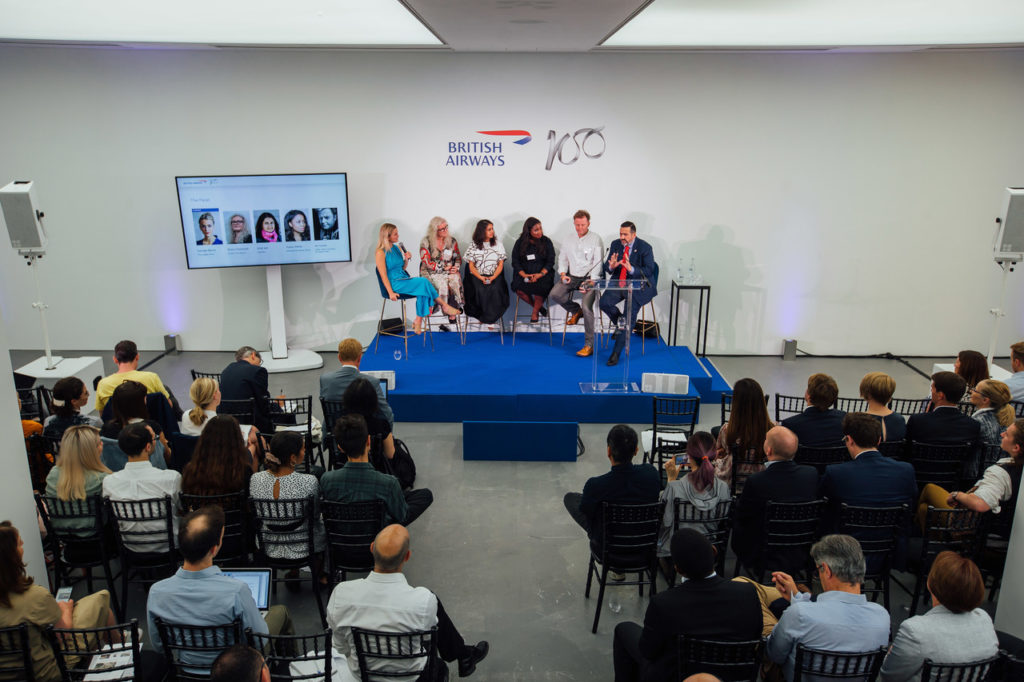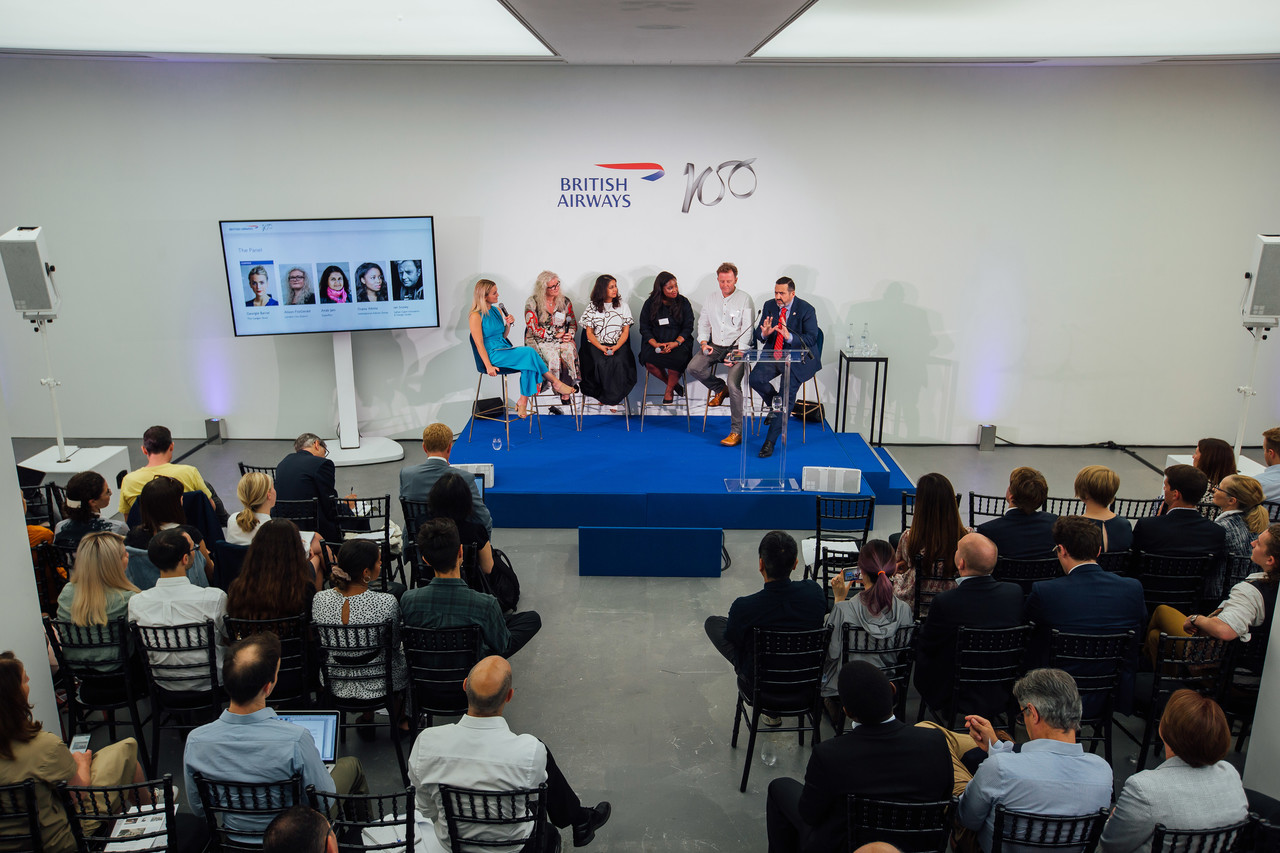My tough question to the CEO of British Airways – The next 100 years of Aviation at the Saatchi Gallery Part 2
As described in Part 1 of this post, the Saatchi Gallery hosts an exhibition for the next 3 weeks on the future of aviation. I was invited to the press launch and exhibition preview which also had a presentation from where Alex Cruz, CEO of British Airways and a discussion. In this part I cover some of the points raised in the Q&A.
The discussion panel comprised, sat left to right in the photo below:
- Host and TV presenter Georgie Barrat,
- Alison Fitzgerald, Chief Operating Officer, London City Airport;
- Anab Jain, Director & Co-founder, Superflux (futurists);
- Dupsy Abiola, Head of Global Innovation, International Airlines Group
- Ian Scoley, Vice President, Safran Cabin Innovation & Design Studio, California.
- Alex Cruz, Chairman and CEO of British Airways.

I don't think the event was filmed, so I do not have access to any video footage. I was allowed one question to the panel, so I targetted Alison Fitzgerald and Alex Cruz:
The global population is rising, as is the so-called middle class who seek better employment, prosperity and security in the short term. How should infrastructure and airlines balance the conflict between sustainability demands of next century against the prosperity demands of now?
The transcript of their responses:
Alex Cruz: I think that is the existential question that all of us are trying to answer. There is no easy, punchy solution. There is one extreme solution that we could all make which is starting tomorrow no-one ever boards a plane again. I think if we look at all the alternatives in terms of sustainability of living as humans and helping each other as humans across region and learning from each other etc., air travel continues to have a role in communications and facilitating the world to becoming a better place.
However, we can no longer undertake that commitment unless we acknowledge that we now know much more information than we did 10-20 years ago with regards to the future of our planet. Unless we do something about it we know this current way is not going to work. I think there are enough checks and balances in our society that there will be a lot changes, a lot of commitments made, money being invested, so it will be balancing act through the next 5-20 years maybe.
It's going to be tricky, I absolutely believe it's going to be tricky.
We have a department within the company only aimed at fuel preservation that's been around for 30 years. These people's jobs are to think of many different ways to consume less fuel, mostly by looking at the weight of the aircraft. For years and years the presentations from these people would say “if we do this we're going to save X million pounds per year”.
I'm so proud to tell you that they no longer speak that way anymore! The younger people in that team make presentations that say “by doing this we're going to save this amount of CO2 emissions” and when the finance person asks “how much money?”, their first reaction is “oh we don't know yet! It's the CO2 emissions that we care about!”. It's the mindset shift in companies like ours that actually drive those decisions that will make travel more sustainable. Having said that I acknowledge the challenges that we all face in our society.
Alison Fitzgerald: To add to that, of course there is still a demand for air travel – albeit a mixed demand between leisure and business. We've grown 40% over the last 5 years and we're not seeing that changing any time soon. There is a challenge around business doing business differently, but immediately we are looking to the future at how we can become sustainable ourselves and how we can support that fight against climate change. At City Airport we have signed up to be carbon neutral by 2050 and in our future plans we want 75% of our next generation jets to be reducing, per mile, the emissions per passenger. Those are the targets we set today because they are within our horizon and they are things that we can influence immediately.
Dupsy Abiola: I also want to add, I know that things can sometimes seem scary but if we look at proxies for mobility from other industries, e.g. car industry, you see within a short amount of time a huge shift towards hybrid-electric cars which is continuing and has been made possible by a layer of innovations from other industries such as space technology. A 1% improvement there can really move the needle right across the board. So yes there are challenges for today but I can promise that within IAG there is really the heart to move towards a more sustainable world.
There was no time for follow up questions but if any of Alison, Dupsy or Alex are reading I would love to invite them to provide comment to either of the below:
- How much responsibility should the aviation industry assume towards influencing sustainable consumer behaviour (in this case travellers)?
- If a sustainable future meant a small sacrifice in safety and welfare now, is that risk worth taking?
I spoke briefly with Alex after the event finished. It also happened to be my first time meeting him. What struck me was his passion to solve those huge, difficult problems (as should any CEO of such a big company!) but also remaining level-headed in his composure and mannerism, and for that I do commend him.
Let's not forget too how he was defused this protest just 20 minutes before:
Someone protesting against BA at their BA2119 Future of Flying event against their involvement in deportations.
No reaction from audience, then politely and calmly dispatched by @alex_cruz. Well done sir! pic.twitter.com/uQxP6Q3RJi
— Points to be Made (@PTBMade) July 30, 2019
We may get another opportunity next week to chat as we will be on the inaugural A350 flight from London to Madrid together, along with about 50 other BA staff and media professionals who no doubt all want to speak to him too. But if readers want to leave a question for him to answer then we might be able to select the best few to put forward.


One Comment
Comments are closed.